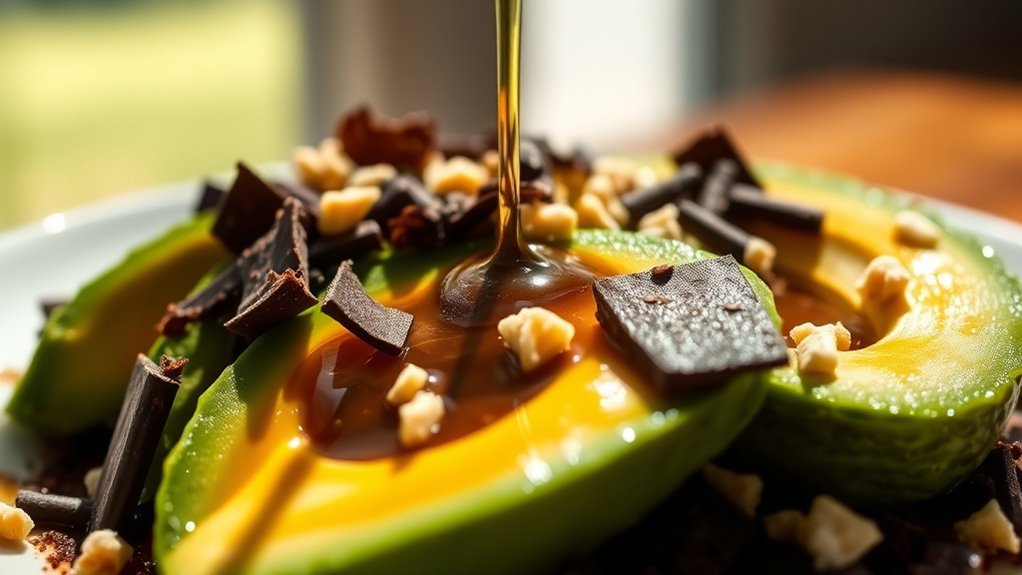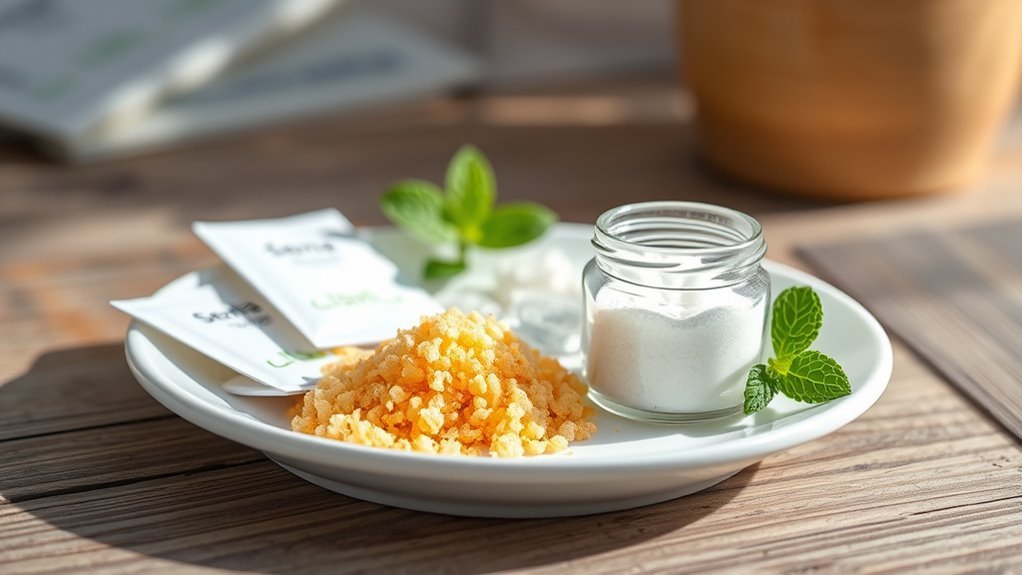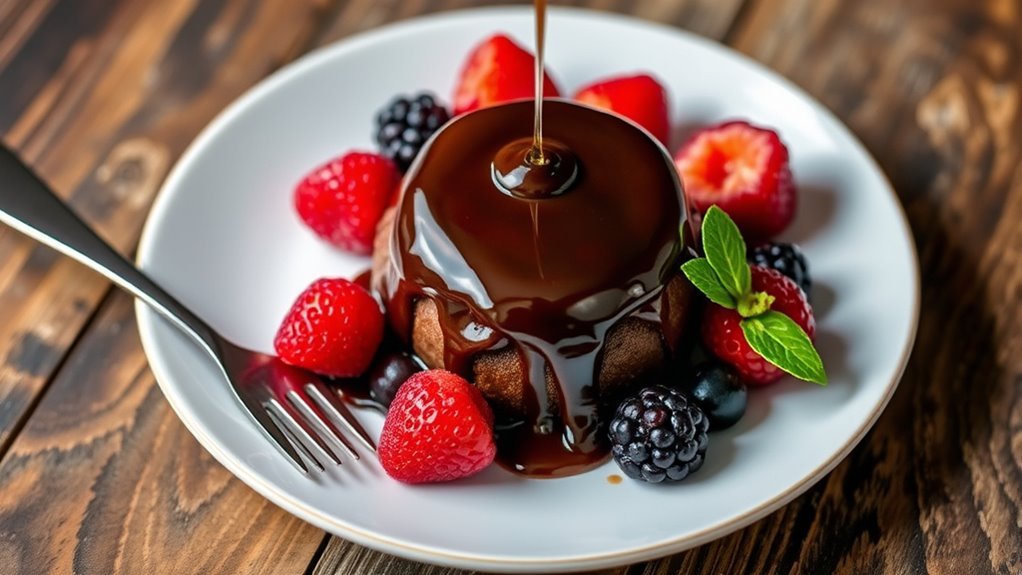On a keto diet, sugar intake is highly limited. Even small amounts of high-carb sugars can disrupt ketosis, making it hard to achieve your goals. While some natural sugars, like honey or maple syrup, should be avoided, sugar substitutes such as erythritol or stevia can satisfy your sweet cravings without impacting blood sugar. It’s essential to choose wisely and understand the impact of different sweeteners on your body. There’s more to uncover about satisfying your sweet tooth on keto.
Understanding Carbohydrates and Ketosis

When you immerse yourself in the keto diet, it’s crucial to understand how carbohydrates affect your body and the state of ketosis. Carbohydrate types greatly influence your energy levels and metabolic state. Simple carbs, like sugar, can spike your blood sugar, pushing you out of ketosis. In contrast, complex carbs offer a more gradual release of energy, but they’re still limited on keto. Avoiding sugary foods and beverages is essential for maintaining a successful ketogenic lifestyle.
Types of Sugars and Their Impact on Keto

While it’s tempting to think all sugars are created equal, their impact on a ketogenic diet varies considerably. You’ll find that some sugars can knock you out of ketosis, while others offer keto-friendly options. Sugar substitutes, like erythritol and stevia, are popular choices because they have minimal impact on blood sugar levels. Additionally, understanding the high glycemic index of certain sugars can help you make better choices on your keto journey.
Here’s a quick comparison:
| Sugar Type | Keto Impact |
|---|---|
| Table Sugar | High (Avoid) |
| Honey | High (Avoid) |
| Erythritol | Low (Keto-friendly) |
| Stevia | Low (Keto-friendly) |
Choosing the right sugar substitutes can help you maintain ketosis while satisfying your sweet tooth. Remember to read labels and stay informed!
Natural Sugars: What to Keep in Mind

Although natural sugars, such as those found in fruits and some dairy products, can provide a quick energy source, they can still affect your ketogenic goals. While you might enjoy natural sweeteners like honey or maple syrup, they can quickly add up in carbohydrates. When considering fruit options, prioritize lower-sugar varieties like berries, which are often more compatible with a keto lifestyle. Apricots, for example, contain significant carbohydrate content and should be consumed mindfully to avoid exceeding your carb limits. Keep portion sizes in mind, as even natural sugars can spike your blood sugar and kick you out of ketosis. Remember, it’s all about balance. Enjoying natural sugars in moderation can give you freedom in your diet, but always stay mindful of how they fit into your overall carb intake.
Artificial Sweeteners: Are They Keto-Friendly?
Are artificial sweeteners a viable option for those on a keto diet? Many people find that these sugar substitutes can satisfy their taste preference without spiking blood sugar levels. However, it’s essential to reflect on potential health implications. Some studies suggest that certain artificial sweeteners may disrupt gut health or affect insulin sensitivity, though more research is needed. Additionally, opting for sugar alternatives can help maintain carb limits while satisfying sweet cravings.
If you choose to include them, moderation strategies are significant. Using small amounts can help you enjoy sweetness without derailing your keto goals. Ultimately, it’s about finding a balance that works for you while being mindful of how artificial sweeteners impact your body. Listen to your body and adjust your intake as needed to maintain your desired level of health and freedom.
Sugar Alcohols: The Good, The Bad, and The Ugly
When considering sugar alcohols on a keto diet, it’s important to understand the different types and their varying effects on your body. While some sugar alcohols can be low in carbs and may not greatly impact ketosis, others can cause gastrointestinal discomfort. You’ll want to weigh the benefits against potential side effects to make informed choices for your keto journey.
Types of Sugar Alcohols
While steering through a ketogenic diet, it’s essential to understand the different types of sugar alcohols available, as they can greatly impact your carb intake and overall health. Here are some key players:
- Erythritol: Known for its low calorie count and minimal impact on blood sugar, making it a popular choice for keto enthusiasts.
- Xylitol: Offers dental benefits but be cautious, as it can be harmful to pets.
- Maltitol: Often found in sugar-free products, it can spike blood sugar levels more than you’d like.
Additionally, consider isomalt’s digestive effects, the advantages of allulose, and sorbitol’s complex metabolism. Understanding these can empower your choices, helping you enjoy your keto journey while staying mindful of your health. It’s also important to be aware that added sugars can disrupt ketosis, making it vital to choose sugar alcohols wisely.
Impact on Ketosis
Understanding the impact of sugar alcohols on ketosis is essential for anyone following a ketogenic diet, as not all sugar alcohols are created equal. Some, like erythritol, have minimal effect on blood sugar and can be a helpful tool for managing sugar cravings without disrupting ketosis maintenance. Others, such as maltitol, can raise blood sugar levels considerably, potentially jeopardizing your state of ketosis. It’s important to choose wisely and read labels carefully. While sugar alcohols can provide a sweet taste, moderation is key. Overindulging can lead to unwanted digestive issues, which might detract from your overall experience on keto. Ultimately, making informed choices about sugar alcohols can help you enjoy your diet while staying in ketosis. Additionally, understanding the impact on ketosis of different foods, like cashews, is crucial for maintaining your low-carb goals.
Common Side Effects
Although sugar alcohols can be a beneficial alternative for satisfying your sweet tooth on a ketogenic diet, they can also come with some common side effects that you should be aware of. While they help curb those keto cravings, they might not be for everyone. Here are some potential downsides to take into account:
- Gastrointestinal Issues: Some people experience bloating, gas, or diarrhea due to incomplete absorption.
- Blood Sugar Impact: Although they’re low-calorie, certain sugar substitutes can still affect your blood sugar levels.
- Overconsumption: It’s easy to overindulge, thinking they’re a guilt-free treat, which can derail your efforts. Additionally, it’s important to remember that maltitol has a moderate glycemic index and can trigger an insulin response, which may affect ketosis.
Being informed about these effects can help you enjoy sugar alcohols wisely while staying true to your keto lifestyle.
Sweeteners to Avoid on a Keto Diet
When following a keto diet, it’s essential to be aware of sweeteners that can hinder your progress. High-carb sweeteners and certain artificial options can spike your blood sugar levels, while natural sugars like honey and agave should also be avoided. Understanding which sweeteners to steer clear of will help keep your carb intake in check and support your dietary goals. For instance, artificial sweeteners like sucralose may affect ketosis despite being low-calorie.
High-Carb Sweeteners
If you’re aiming to maintain a state of ketosis, it’s crucial to steer clear of high-carb sweeteners that can sabotage your efforts. These sugar substitutes may seem innocent, but they can lead to unwanted cravings and hinder your progress. Here are three high-carb sweeteners you should avoid:
- Table Sugar – This common sweetener is a major source of high-carb snacks and can spike your blood sugar levels.
- Honey – While natural, it’s loaded with carbs and can easily kick you out of ketosis.
- Agave Syrup – Often marketed as a healthier option, it’s still high in fructose and detrimental to your keto goals.
Additionally, honey has a higher glycemic index than many sweeteners, which can spike blood sugar levels.
Staying informed about these sweeteners helps you make choices that support your freedom on a keto diet.
Artificial Sweeteners Risks
While many people turn to artificial sweeteners as a low-carb alternative, it is essential to understand the potential risks associated with their use on a keto diet. Some sweeteners, like aspartame and sucralose, can raise health concerns linked to gut health and insulin sensitivity. Research suggests that these artificial options might disrupt your metabolism, leading to negative metabolic effects that could counteract your keto goals. Additionally, they may trigger cravings for sweet foods, making it harder to stick to your diet. It’s important to weigh these risks carefully. Opting for natural alternatives or keeping sweeteners to a minimum could provide a more balanced approach to maintaining your keto lifestyle while prioritizing your overall health. Furthermore, moderation and personal awareness are key in dietary choices, especially when considering the impact of artificial sweeteners on the keto diet.
Natural Sugars to Avoid
Although many people perceive natural sugars as healthier options, several types can still derail your keto diet. It’s essential to be aware of hidden sugars lurking in seemingly innocent foods. Here are three natural sugars you should avoid:
- Honey: Often touted for its health benefits, honey can spike your blood sugar and is high in carbs.
- Agave Nectar: Marketed as a healthy sweetener, agave is actually high in fructose, which can hinder your keto goals.
- Fruit Juices: Even those from natural fruit can contain concentrated sugars, making them detrimental to your carb count.
Satisfying Your Sweet Tooth: Low-Carb Alternatives
How can you satisfy your sweet tooth without derailing your keto diet? It’s easier than you think! When sugar cravings hit, consider healthy substitutes like stevia, erythritol, or monk fruit sweetener. These low-carb options provide a sweet flavoring without the carbs that can disrupt ketosis. You can whip up delicious dessert recipes using almond flour or coconut flour, which keep your carb count low while still delivering on taste. Think keto-friendly brownies or cheesecake with a nut crust! By exploring these alternatives, you’ll maintain your freedom to indulge while staying true to your dietary goals. Satisfying your sweet tooth doesn’t have to mean sacrificing your keto lifestyle; just be creative and enjoy the process!
Moderation Is Key: Balancing Sweetness on Keto
When it comes to enjoying sweetness on a keto diet, moderation truly is vital. While you can indulge in sugar substitutes and keto desserts, balancing your intake is essential for staying on track. Here are three tips to keep in mind:
- Choose wisely: Opt for natural sugar substitutes like stevia or erythritol that won’t spike your blood sugar.
- Portion control: Even keto-friendly treats can add up; keep servings small to avoid cravings and maintain ketosis.
- Mindful indulgence: Savor your desserts, appreciating the flavors and textures—this can help you feel satisfied with less.
Frequently Asked Questions
Can I Use Honey on a Keto Diet?
You can’t really use honey on a keto diet, as it’s high in carbs. However, if you’re craving sweetness, consider honey alternatives like stevia or erythritol. These natural sweeteners can satisfy your sweet tooth without kicking you out of ketosis. It’s all about finding balance; while you might miss honey, there are many options that let you enjoy flavors without compromising your keto goals. Explore these alternatives and stay on track!
How Does Sugar Impact Ketosis?
Sugar can greatly impact ketosis. When you consume sugar, your body prioritizes sugar metabolism for energy over fat, which can kick you out of ketosis. This shift can lead to increased insulin levels, making it harder for your body to burn fat. To maintain ketosis, it’s essential to limit sugar intake, as even small amounts can interfere with your progress. Balancing your diet with low-carb options can help you stay in that fat-burning state.
What Is the Ideal Daily Carb Limit for Keto?
In the grand tapestry of keto living, you’ll find that the ideal daily carb limit typically hovers around 20 to 50 grams. This isn’t a strict rule, but a guideline for carb counting that offers flexibility within your journey. You can navigate your meals with a sense of freedom, as long as you stay mindful of those carbs. Embrace the balance, and let your body guide you toward achieving and maintaining ketosis.
Are There Any Health Risks of Sugar Substitutes?
Yes, there can be health risks associated with sugar substitutes. While artificial sweeteners are generally considered safe, some studies suggest they may affect gut health and insulin sensitivity. Natural alternatives like stevia or erythritol have fewer side effects, but they might still cause digestive discomfort in some individuals. It’s important to monitor your body’s response and choose options that align with your health goals, enjoying the freedom of a balanced diet without excess sugar.
Can I Satisfy Cravings Without Sugar on Keto?
You can absolutely satisfy your cravings without sugar on keto. Think of sugar alternatives as your trusty allies in a culinary adventure. There’s a world of keto snacks waiting to delight your taste buds—like dark chocolate or almond flour cookies—full of flavor yet low in carbs. Stevia or erythritol can sweeten your treats without derailing your goals. So, embrace these options and enjoy the freedom to indulge without the guilt!
References
- https://www.ncbi.nlm.nih.gov/pmc/articles/PMC6482503/
- https://www.healthline.com/nutrition/keto-diet-and-sugar
- https://www.webmd.com/diet/ss/slideshow-keto-diet
- https://www.mayoclinic.org/healthy-lifestyle/nutrition-and-healthy-eating/expert-answers/keto-diet/faq-20490562
- https://www.cdc.gov/diabetes/basics/diabetes.html
- https://www.jamanetwork.com/journals/jama/fullarticle/2765251
- https://www.diabetes.org/healthy-living/recipes/nutrition-facts/keto-diet
- https://www.nutrition.gov/topics/nutrition-101/what-keto-diet


